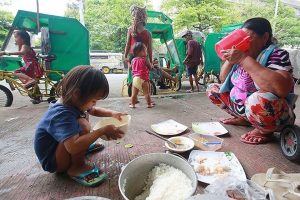THE World Bank has approved a $178.1-million loan to the Philippines to support efforts to curb malnutrition, which has worsened due to the rising costs of food.
The program, the Philippines Multisectoral Nutrition Project, will provide nutrition support and health services to help reduce growth stunting in infants and young children, in 235 municipalities with high incidences of poverty and malnutrition.
“The persistence of high levels of childhood undernutrition in the Philippines, exacerbated by the pandemic, could lead to a significant increase in inequality of opportunities in the country,” Ndiamé Diop, World Bank country director for Brunei, Malaysia, the Philippines, and Thailand, said. “Where healthy children can do well in school and look forward to a prosperous future, stunted children tend to be sickly, learn less, more likely to drop out of school and their economic productivity as adults can be clipped by more than 10% in their lifetime.”
“Hence, improving the nutritional status of children is key to the country’s goals of boosting human capital while strengthening the country’s economic recovery and prospects for long-term growth.”
Households in the selected local government units with pregnant women and children under two years of age will be eligible for regular feeding for the young, growth monitoring, nutrient supplements for children aged between 6 to 23 months, iron-folic acid supplements for pregnant women, diet support, and treatment for malnutrition.
The project will also help change habits in households deemed crucial in improving health and nutrition in women and children, including hand washing with soap, better sanitation and access to drinking water, early child care and development and activities, and promoting access to the Pantawid Pamilyang Pilipino Program (4Ps), a conditional cash transfer targeted at the poor.
The Department of Social Welfare and Development’s 4Ps program grants eligible families cash aid if they keep children in school and submit to health checks.
These health and nutrition interventions are focused on the first 1,000 days of children’s lives, a critical period in their development.
“Undernutrition and exposure to risk and adversity during the first 1,000 days of the child’s life can disrupt cognitive, emotional, and physical development and hold children back from reaching their full potential, thus affecting the formation of the country’s human capital,” World Bank Senior Nutrition Specialist for East Asia and the Pacific Region Nkosinathi Mbuya said.
“Therefore, interventions to improve nutritional outcomes must focus on this age group and women of child-bearing age.”
Such risks include poverty, malnutrition, lack of access to clean water and sanitation facilities, exposure to child abuse, violence, and neglect, and a lack of quality health, education, and nutrition.
The Russia-Ukraine war will make such problems worse, especially the food and nutrition situation inside Filipino households. The rising costs of food globally means that unless immediate action is taken, millions of children will face an increased risk of undernutrition, which translates to poor school performance and low productivity as adults.
Food inflation in the Philippines was 5.2% in May, up from the 3.7% a year earlier, and from 4.9% in April. — Tobias Jared Tomas
